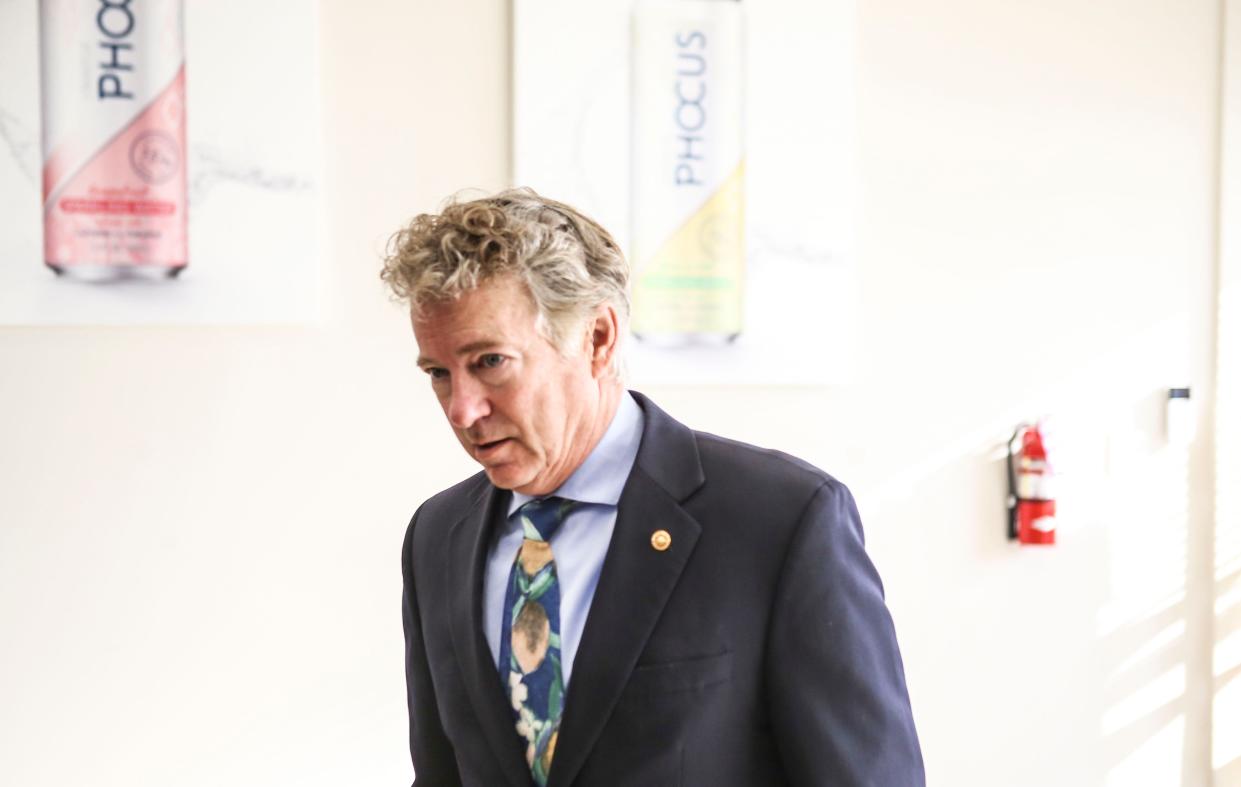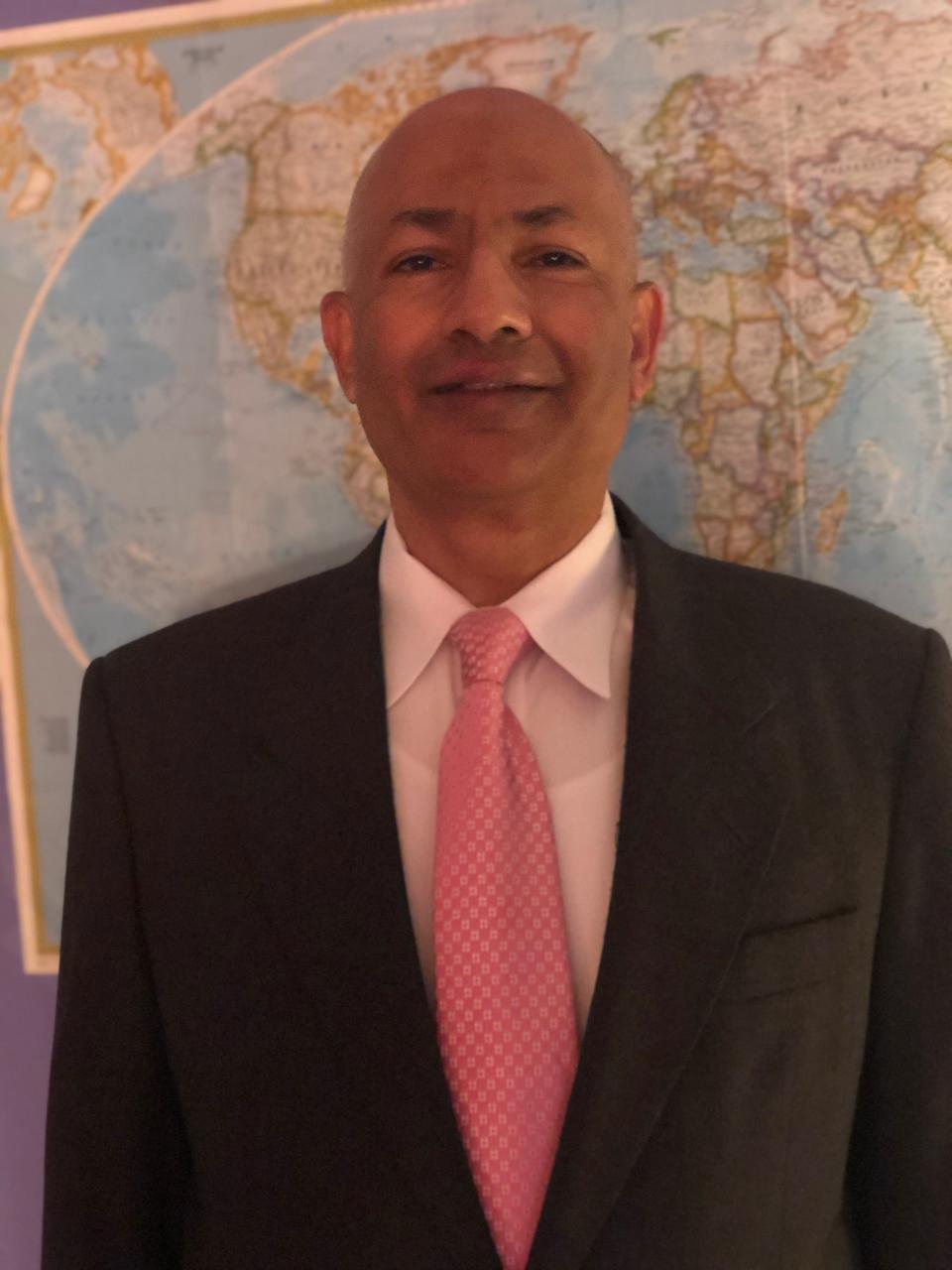It's now Russia Rand. Why Rand Paul is wrong about Ukraine and Russia | Opinion

- Oops!Something went wrong.Please try again later.
- Oops!Something went wrong.Please try again later.
- Oops!Something went wrong.Please try again later.
Sen. Rand Paul, in his column on the Ukraine situation, depicts a surrender mentality, proving that it’s not just “Moscow Mitch” who, consequent to his inability and/or unwillingness to confront Donald Trump’s enigmatic subservience to Vladimir Putin, has become Russia’s de facto agent in the United States Senate, but also the other senator from Kentucky – let’s deservedly call him Russia Rand.
Paul inaptly quotes from Henry Kissinger’s 2014 op-ed on the Russia-Ukraine conflict and then narrates theoretical stuff from political science 101. No offense to political science students of freshman year; they have to start somewhere.
But when a U.S. senator rambles on about what economic sanctions against a target can or cannot achieve without cogently applying his points to the situation at hand, it smacks of utter incompetence and constitutes his lack of comprehension of what America, its allies, and last, but not the least, the people of Ukraine, face.
You’re reading one perspective on this issue.
For The Opposing View, read: "Rand Paul: Here's how we prevent war in Ukraine | Opinion"
Read Ran Paul's Column: Rand Paul: Here's how we prevent war in Ukraine | Opinion
The Kissinger op-ed appeared on March 6, 2014. Just a week earlier, Putin captured a part of Crimea, completing the annexation a month later. Kissinger wrote the op-ed in that context, suggesting restraint on the part of all parties, including Russia. It is intellectually dishonest to imply that Kissinger questioned Ukrainians’ right of self-determination.
Paul suggests more diplomacy with Putin. The West has already tried talks twice. Moreover, President Joe Biden has called Putin. And the door to diplomacy is still open. But lacking the courage to halt diplomacy eventually emboldens the enemy. And sanctions are a form of diplomacy too. Taking a tough stand against the enemy can help avert a war, but lacking the courage to fight a war will definitely cause war.
Meanwhile, America’s placing 8,500 of its troops on high alert that bothered Paul more than it bothered Putin is a form of diplomacy! It’s not a declaration of war. When at one point during the Yom Kippur War of October 1973 that had caught Israel off-guard, it looked that Egypt was going to overrun Israel, President Richard Nixon ordered a nuclear alert. It was a form of diplomacy, not a nuclear attack on Egypt.
I wonder how far diplomacy would have taken the allies if they had tried to call Emperor Hirohito, Hitler or Mussolini. Actually, Neville Chamberlain did try Paul’s defeatist approach, known as “Chamberlain appeasement.” As Chamberlain discovered, dictators don’t make deals for the sake of humanistic principles. They do it for self-preservation.
Saying that the West is forcing Ukraine to join NATO immediately is a lie that Putin and his Trump-fearing American surrogates are repeating. The West is only saying this: Any country in the NATO region can apply for membership. But Paul wants the West to preclude that possibility? Why? Perhaps, he thinks Kentuckians are beholden to Trump and Trump loves Putin and thus Paul’s reelection to the Senate will be in jeopardy if Paul does not act as Putin’s agent.
It is shocking that Paul sees “no national security interest for the United States” in Putin threatening Ukraine, a pro-West European country. The expression I wanted to use to that will certainly be taken out by the editors, so I’ll refrain. But Paul needs history-101 too.
More: Ukraine crisis: Explainer as tensions rise
Here is some history, though: The Soviet Union joined the allies against Hitler, not for the sake of humanity, but to neutralize Hitler. Even during the height of the war, Winston Churchill used to wonder aloud about the allies’ despondency of having to rely upon Stalin and what the future thus held.
Soon after the war ended, Stalin demanded his cut. Understandably, freedom’s victory over tyranny was not a reward for him. In fact, freedom in Europe was a cost to him. It was in that context that the process that culminated in NATO’s birth in 1949 started. NATO hasn’t looked back since. But now an American senator wants to clip NATO’s wings, probably because he thinks that doing so can get him reelected in Kentucky.
The Ukrainian people spoke loudly and clearly in Aug. of 1991, when they, in a referendum, overwhelmingly chose independence from the then moribund Soviet Union. They did not want any special ties with the post-Soviet Russia either, just normal friendly ties. Even in those parts of Ukraine, where ethnic Russians were in majority, the result of the referendum favored a free Ukraine. Today, Paul has the guile to second-guess Ukrainians’ aspirations.
Even the breakup of the Soviet Union happened with Ukraine’s help. Two Soviet republics that, like Ukraine, were still technically constituents of the Soviet Union, Belarus and Russia, joined Ukraine in creating the Commonwealth of Independent States that in Dec. 1991 heralded the demise of the Soviet Union. It was the then Ukrainian president, Leonid Kravchuk, who insisted that the new entity must not have the word “union” in its name, lest it reminded people of the repressive behemoth that it was replacing.
In 1994, Ukraine signed an accord with America, Britain and one more country. The accord made Ukraine relinquish the nuclear materials that it had inherited from the Soviet Union. In return, the trio committed to Ukraine’s sovereignty over its territory including Crimea. The third country was Russia.
Paul writes, “... peace will not be possible as long as our government’s position is ‘my way or the highway.’ Diplomacy involves understanding … your adversaries’ position. Diplomacy involves give and take. Demands are not diplomacy.”
It is “our government’s position” that bothers Paul, because it confronts Trump’s buddy, Putin. Obviously, Paul is aloof to the list of “demands” Putin dropped at the West’s door. That list, in Paul’s worldview, probably embodies a masterpiece of diplomacy, not absurd “demands.”

If the West surrenders to Putin on Ukraine, he will want more. Paul will probably want America to continue with surrendering to the enemy. Imagine what would have happened, had America and its European allies, while dealing with Hitler, persisted with “Chamberlain appeasement.”
Paul seems short on courage and charisma, but high on lust for power. He is weak in history and politics but wants the West to follow his political advice. No worries, the West knows better: Its leader is Biden, not Trump.
Siddique Malik is an observer of sociopolitical affairs. Find him @The SummerOf1787.
Interested in writing an op-ed or guest column?
Read tips here: How to submit a guest opinion column or op-ed to The Courier Journal
This article originally appeared on Louisville Courier Journal: Here's why Rand Paul is wrong about Ukraine and Russia | Opinion

